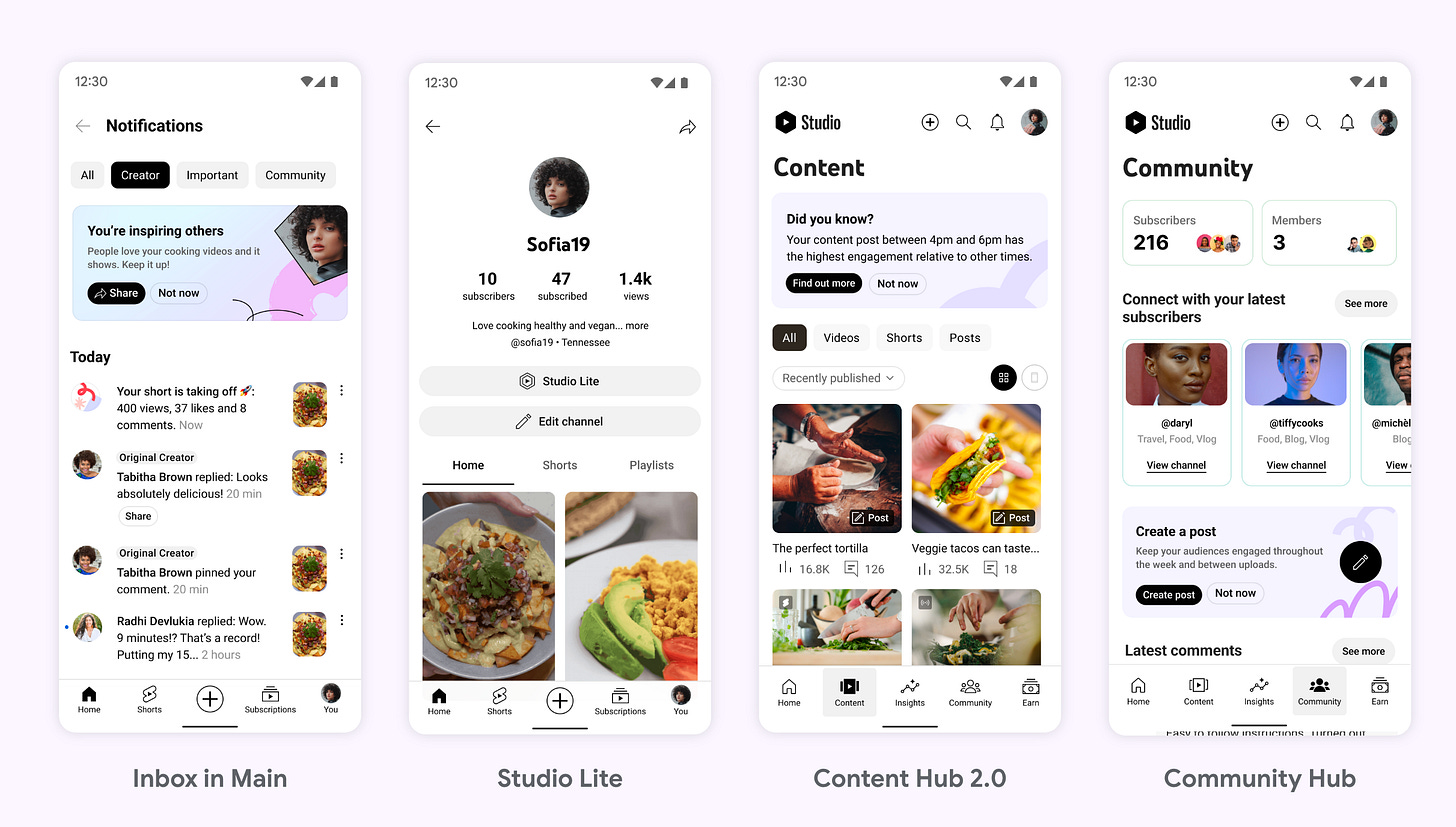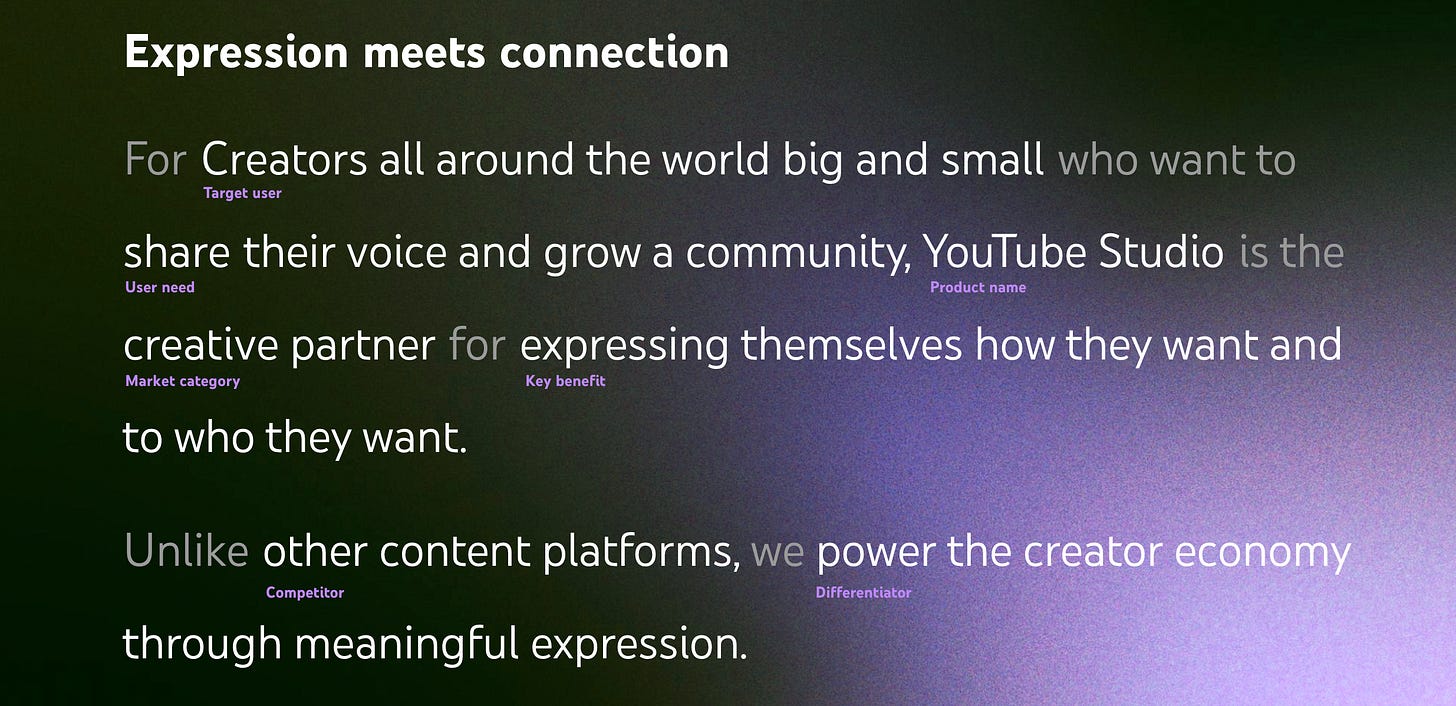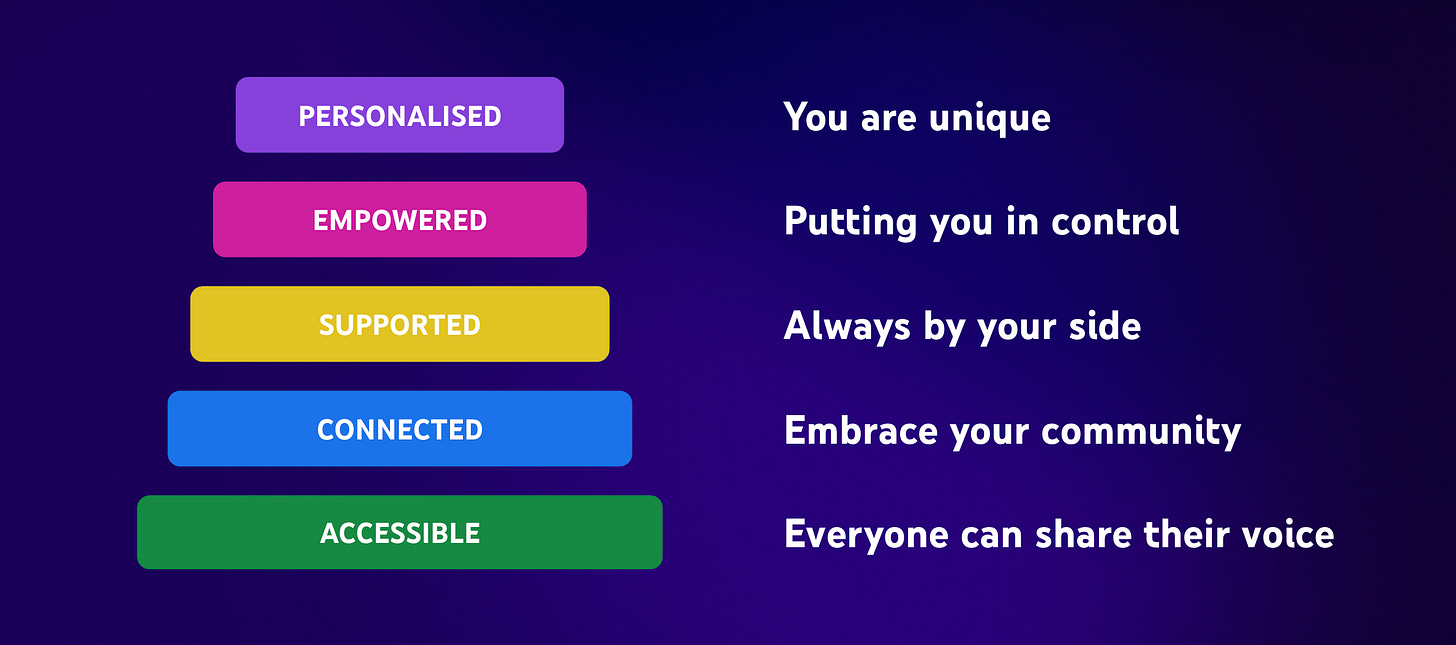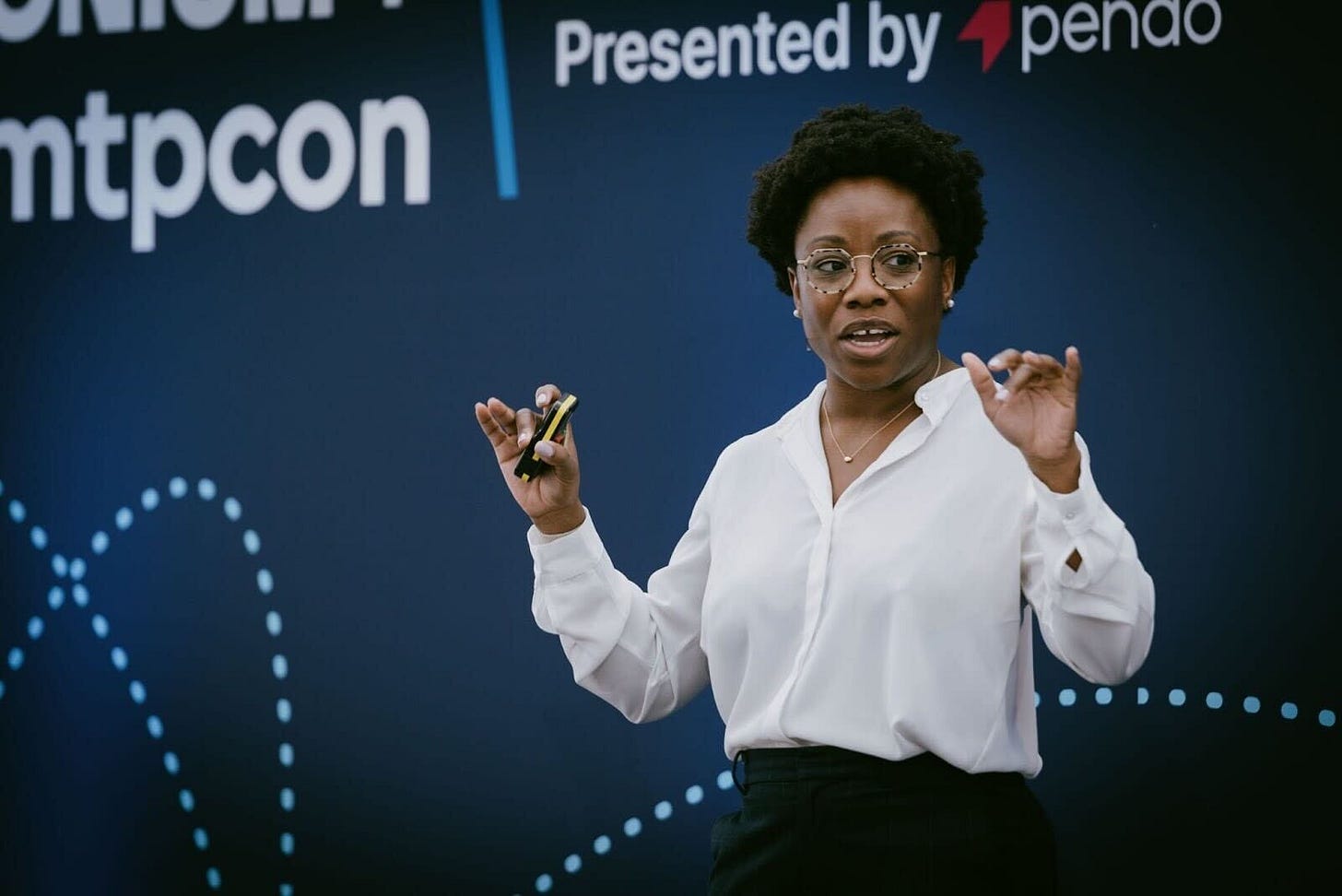This Vision Playbook Will Change YouTube and Your Life | Ebi Atawodi
An inside look at crafting YouTube Studio (the #1 creator tool in the world) and how to find purpose beyond your job title
Dear subscribers,
Today, I want to share a new episode with Ebi Atawodi.
Ebi is the Director of Product for YouTube Studio, the home for 65M creators (including me). Ebi gave me an inside look at crafting Studio’s vision and how to define yourself beyond your job title. Ebi’s super inspiring, and you'll love our chat.
Watch now on YouTube, Apple, and Spotify.
This episode is brought to you by Vanta — Join 9,000+ companies like Atlassian and Quora who use Vanta to manage risk and prove security in real time. Get $1000 off at vanta.com/peter
Ebi and I talked about:
(00:00) If I took away your job title, who are you?
(03:44) Defining the vision for YouTube Studio the vision for YouTube Studio
(07:30) Tell me what's painful, not what you shipped
(11:18) Transforming a vision into strategic themes
(21:24) What most people don't realize about platform PMs
(28:59) Balancing the needs of big and small creators
(33:23) Why the little moments really matter for creators
(38:01) Why Ebi took time off to make a short film
(43:50) I'm a storyteller, and nobody can take that away
Defining the vision for YouTube Studio
Welcome, Ebi! So YouTube Studio is arguably the most popular creator tool out there, with 65M creators relying on it for everything from video management to analytics. What’s your vision for the product?
My vision is that:
Studio is your creative partner. It lets you tell your story authentically while building meaningful connections with your community.
How did you work with the team to develop this vision?
I used this framework to onboard to my new role when I joined YouTube, out of that came the insight that we needed a clear vision and product statement:
Conversations, where I spoke with 40 people — including my VP, their peers, engineering, design, UX research, and more — to identify common themes.
Comprehension, where I made sense of what I've heard. My closing question was always: "If you were in my role, what 3 things would you do?" I tallied the responses to create a prioritized list of what people cared most about.
Conviction, where I took action on my insights. It became clear that people were struggling with whether we should focus on becoming a platform for internal YouTube teams or build product directly for creators.
How did you and the team reason through that choice?
With that insight and with strong buy in from my UX, UXR, and Eng peers. We locked ourselves in a room for 4 days to answer questions like: Who are we? What is our product? What’s our vision, strategy, and product principles?
The first two days were crucial:
Day one focused on insights. Each team had 30 minutes to present their pain points. Since Studio serves multiple products and user types, having people from every vertical was crucial.
Day two focused on brainstorming. Everyone wrote headlines for their ideal version of the product. A theme that kept emerging was "connection."
People think that YouTube creators only obsess about views and subscribers, but surprisingly there’s a human element at the core.
When creators face challenges, it’s their tight-knit community that keeps them going.
So we defined our mission as “Expression meets connection.” When you express yourself using Studio, you create that connection.
How did you translate this statement into a concrete product direction?
We had everyone sketch four App Store screenshots for their dream version of Studio. The four-screen limit forced everyone to prioritize what mattered most. Many came up with a rich community hub beyond comments and support for multiple formats.
Importantly, no one designed Studio as just a platform of components for internal teams.
This naturally answered our earlier question about whether we're a platform or a product. We also came up with a hierarchy of creator needs in our brainstorming:
This hierarchy made ups realize we needed to nail the fundamentals first. For example, creating personalized features was pointless when creators couldn't even upload videos on mobile.
These themes now guide our annual strategic planning. One PM leads one theme, so five PMs in the team lead the strategic imperatives per year.
How do you balance being a platform versus a product team?
It’s funny because at Studio:
We support 40 product teams who all think that their feature is the P0 that needs to ship.
I think platform PMs must be stronger than regular PMs because they need to empathize with multiple customers' needs. They need to see around corners and predict trends. For example, we realized that every team probably wanted to build AI features. Instead of having everyone build their solution, we're proactively thinking about ways to provide shared context so teams have a single source of truth for AI.
Here's another example: We had 4 teams who wanted to build different video collection features for TV shows, playlists, podcasts, and courses. One of my PMs pushed back and instead created a scalable collection framework they could all use. While this initially slowed teams down, it enabled us to provide collection-level analytics that now benefit all teams.
What are Studio's core principles that guide these decisions?
Our number one principle is "creators first."
When teams want to add a feature to Studio, they need to present user research or justify how this benefits creators.
Another key principle is that we're a place where everyone can tell their story. This means our product should work equally well for creators who focus on video, Shorts, live streams, or any combination. We've built equity into the product – for example, the content hub now shows all formats instead of defaulting to long-form videos.
These principles emerged during day three of our vision process, after insights and visioning. By day four, we locked in strategic imperatives and the key products that would bring them to life.
What were the main strategic products or initiatives you landed on?
We organized our strategy around three key phases:
Find your voice: Creators who are just starting are still exploring what works for them. We recognized that these creators mainly use the YouTube app rather than Studio, so we created Studio Mini, a lightweight version within the main YouTube app that provides basic analytics and comment management.
Refine your voice: Creators who've found their niche want to explore it further. Key products include full analytics parity on mobile, Content Hub with multi-format support, Community Hub, and enhanced AI-powered inspiration features.
Sustain your voice: Creators who are established want to avoid burnout. Like life itself, they need both big moments and small victories. We create "micro-moments of happiness" - small but meaningful celebrations like: "Congratulations, you reached 50K views!"
How do you balance the needs of big and small creators?
Both need motivation—it just looks different. A small creator might want to earn their first hundred dollars, while a big creator aims for a million. But the core need is the same. We're building products for humans, and everyone needs goals.
Do you encourage your team to experience being creators themselves?
Absolutely.
Many PMs forget to stay as hungry about their product as their customers.
You can’t build empathy for creators if you haven’t experienced the same issues yourself. If you're uncomfortable putting yourself out there, maybe start by recording your dog. The point is to understand the creator's experience firsthand.
Defining your personal vision and purpose
You've worked at YouTube, Uber, and Netflix and are also on Lego's board. I’d love to hear about your personal vision and purpose.
My purpose is to empower and inspire people through stories.
Looking back at my career, that thread has always been there, though it wasn't always clear. One of my proudest early moments was publishing a book on Nigerian photography – a small project that grew into a four-year journey.
These personal creative projects actually energize my work.
When you pursue things that feed your soul, you bring that passion and energy back to what you're building at work.
Do you have advice for people to define themselves by their personal stories rather than job titles?
I ask people:
If I took away “Google” “PM,” or “Director,” who are you?
The number of blank stares I get is telling. Some say "parent" or "partner," but what if you keep chipping away – what's the essence? What's left?
For me, I'm a storyteller. That's who I am and what I want to be known for. I'm a lover of beautiful things – I collect flyers and other items. People might add other qualities like "knows how to do vision" or "quick learner," but what's your core identity?
It's crucial to know your complete story because that's what the company originally hired - the whole person, not just a job title.
When you start defining yourself solely by your role or company, you risk putting unfair expectations on the company to be your source of fulfillment. Having a clear sense of who you are beyond work actually allows you to bring more energy, passion, and meaning to your work, while maintaining a healthy perspective on your identity.
I bring storytelling to everything I do at Google. When we developed the "Find Your Voice" vision, instead of writing traditional product requirements like "As a user, I want to..." I wrote an actual narrative: "Meet Sophia, she's 19..." I described her morning, how she interacts with notifications, how she understands her world from the moment she wakes up. This storytelling approach helps teams truly empathize with creators rather than just thinking about feature requirements.
Even in my Lego board interview, I talked about how every Lego box contains a story — whether you're building Notre Dame or the Titanic, you're either following an existing story or creating your own. I'm now at a place where I actively look for opportunities that align with my storytelling purpose.
You’re also making a short film yourself, can you talk more about that?
Sure, my short film celebrates West African artistry. I took a week off work and shot it in five days.
The film follows the making of a talking drum, an instrument that literally speaks through membrane manipulation. What started as a story about one craftsperson evolved into something bigger. I learned there's no single person who makes a drum – it's impossible. This reflects a universal truth: nothing is truly made by one person. There's always someone who cut the raw materials, someone who transported them, someone who designed the process.
The film is called "DUN DUN," which means "sweet sound" in Yoruba. It's a 15-minute documentary that captures this community of craftspeople – the tannery, the woodcutter, the maker – all coming together to create something beautiful.
In many ways, this journey of making the film reflects what we're trying to do at YouTube Studio – empowering people to tell their stories while recognizing that great things come from collaboration and community.
Thank you Ebi! If you loved this interview, please follow Ebi on LinkedIn and check out the trailer for her new short film.







